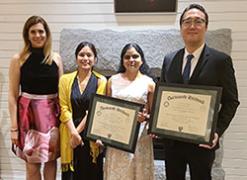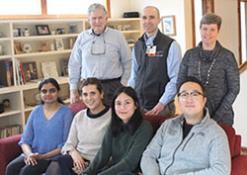The Endocrinology, Diabetes, and Metabolism fellowship is a fully accredited two-year program with 2 positions offered annually. The program is based at Dartmouth Hitchcock Medical Center in Lebanon, New Hampshire, and includes rotations at the VA Medical Center in White River Junction, Vermont.
Dartmouth Hitchcock Medical Center is a 400-bed tertiary care facility that principally serves the health care needs of the populations of New Hampshire, Vermont, southern Maine, and northern Massachusetts. Postgraduate fellows have the opportunity to serve a broad panel of patients with a rich diversity of diagnoses and demographics.
The goal of our fellowship is to prepare internists for careers in academic medicine or clinical practice in the broad field of endocrinology. Important components of our training program include inpatient and outpatient consultative services, longitudinal care of individuals with both common and unusual endocrine disorders, specialty diabetes care, endocrine imaging, transgender medicine, ultrasound-guided thyroid aspiration biopsy, pediatric endocrinology, and endocrine pathology.
Fellows are full participants in the academic activities of the Department of Medicine including opportunities to participate in the teaching of medical students and house staff.
Welcome to Dartmouth Hitchcock Medical Center
We have everything that you would expect a major academic center to have, from inpatient wards, outpatient clinics, to a cardiac Cath lab. Dartmouth Hitchcock Medical Center is a beautiful institution and provides a welcoming collegial atmosphere.
Mission
Patients with endocrine disorders are evaluated and cared for predominantly in an ambulatory setting. Thus, our program emphasizes outpatient continuity clinics as principal educational venues. The fellow’s ambulatory continuity clinics at Dartmouth Hitchcock Medical Center are General Endocrine New Patient Clinics (3 per week per fellow). The fellows provide both consultative and continuity care to general endocrine and diabetic patients. These clinics extend throughout both years of the Clinical Track and provide abundant opportunities for fellows to evaluate and treat patients with a broad spectrum of endocrine disorders.
Program aims
Goals
To render first- and second-year endocrine fellows highly competent in the care of patients with general endocrine disorders by providing them with education and experience in evaluating and treating patients in an ambulatory setting with a wide variety of diseases related to the adrenal gland, the calcium and bone axis, the hypothalamic/pituitary axis, the reproductive organs, the thyroid gland and diabetes.
Objectives: Patient care
- To appreciate the underlying principles and demonstrate competency in obtaining a focused and accurate history in patients with endocrine disorders.
- To appreciate the underlying principles and demonstrate competency in performing an examination that elicits physical findings pertinent to the presence and evaluation of patients with endocrine disorders.
- To identify key symptom complexes indicative of endocrine disorders.
- To formulate an accurate differential diagnosis and cost-effective diagnostic plan to further evaluate patients with an endocrine disorder.
- To utilize decision analysis to the ordering and interpretation of endocrine tests.
- To formulate an appropriate and cost-effective treatment plan based on best available evidence and knowledge of clinical pharmacology and hormonal dynamics and function.
- To formulate appropriate follow-up plans for patients based on knowledge of the natural history of the specific endocrine disorder.
- To recognize and manage emergent conditions related to extreme dysfunction of the adrenal, pituitary, and thyroid glands of disordered calcium homeostasis.
- To recognize and manage hormone disorders during pregnancy or in the post-partum period.
- To appreciate the differences in presentation and management of endocrine disorders in the elderly.




